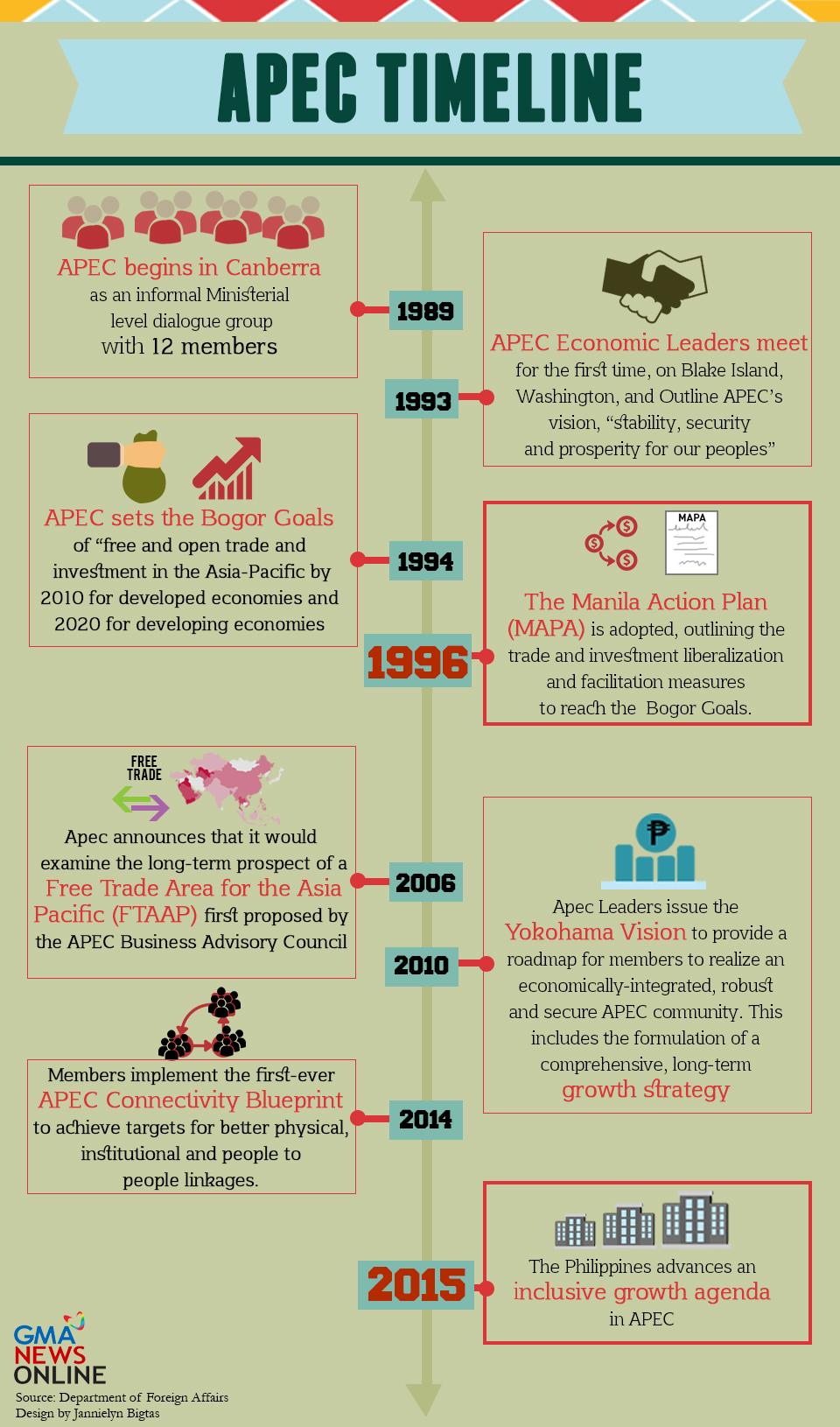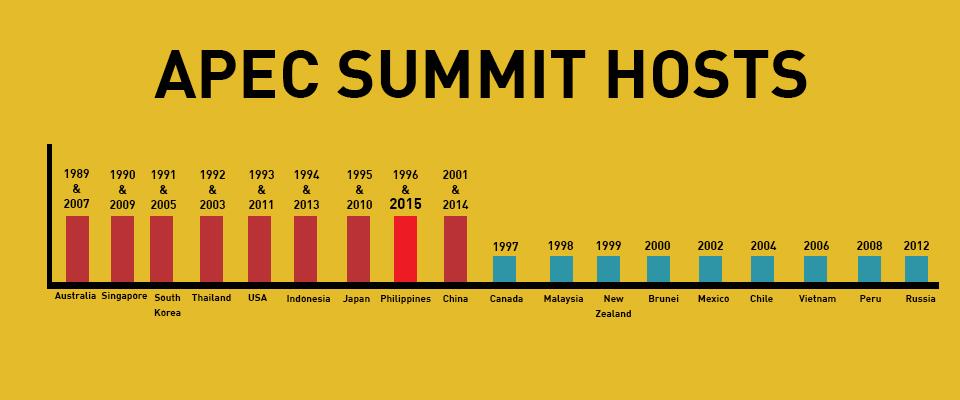The Philippine agenda
For a country that has long struggled with poverty, hosting the Asia-Pacific Economic Cooperation (APEC) serves another opportunity to promote an agenda of economic development rather than mere growth.
Economic development encompasses the enrichment of people's lives and the improvement of their living standards alongside growing investment, output and resources.
In hosting the APEC meeting this year, the Philippines is advancing the concept of inclusive growth that more or less traverses along the lines of economic development on a theme of "Building Inclusive Economies, Building a Better World."
"The theme this year is inclusive development and a better world, which is actually perfect for the Philippines' economic situation," Richard Heydarian, a foreign affairs and economic analyst, said in an interview with GMA News' "News to Go."
The overarching agenda of APEC 2015 aligns with the Aquino administration's thrust of inclusive growth, where even the poor feel what an expansion in gross domestic product actually means.
In a separate interview with GMA News Online, an official of the Department of Foreign Affairs explained further the concept.
"We used the ideals of the Philippine government and we wrapped them around an APEC agenda and then it turned out to be a perfect timing," Laura del Rosario, Foreign Affairs undersecretary for international economic relations, said.

Inclusive growth
On inclusive growth, the Philippines is setting the priorities of APEC 2015 on enhancing regional economic integration, fostering the engagement of micro, small and medium enterprises (MSMEs) in regional and global markets, investing in human capital development and building sustainable and resilient communities.
The regional economic integration agenda entails relaxing regulatory barriers, creating greater access to financial services and other structural reforms to strengthen trade in services and improve ease of doing business across the region.
The reforms are envisioned to allow MSMEs to participate in regional and global markets by supplying the bigger businesses, for instance. These are expected to eventually generate employment in Asia-Pacific.
Investing in human capital development – which includes skills training and health programs, sustainable and resilient communities – is necessary in ensuring the capacity of the region to compete in terms of trade.
Leaders from the 21-member economic bloc is holding a summit conference in Manila on November 18 and 19 to approve initiatives aimed at achieving inclusive growth.
These include the Cebu Action Plan endorsed by finance ministers to promote financial integration, fiscal transparency and policy reform, financial resiliency and infrastructure development and financing.
The economic leaders will also consider the Boracay Action Agenda recommended by trade ministers to allow MSMEs to enter the global market and in recognition of the sector's dynamic role in addressing poverty.
"The Philippines is pushing developmental agenda under the principles of three key accountabilities: governance and institution building, social inclusion and cohesion and environmental impact," said Del Rosario, who chairs the APEC Senior Officials' Meeting.
In additional to trade and investment issues, the APEC leaders will discuss food security and the Blue Economy Plan of Action, Disaster Risk Reduction Framework and Roadmap for a Healthy Asia-Pacific 2020 and Role of Women in Development.
"In the past, iyong social inclusion hindi iyan pinag-uusapan kasama ng trade issues. But because of the inclusive growth theme, nagkaroon tayo ng developmental agenda sa APEC," Del Rosario noted.

1996 aspirations
The overarching theme of the APEC meeting this year does not depart far from the aspirations of the member economies when it last met in the Philippines in 1996.
"We came to Subic to reaffirm that the ultimate objective of our individual and collective endeavors is to enrich the lives and to improve the standards of living of all our citizens on a substantial basis," the economic leaders' declaration back then read.
APEC adopted the Manila Action Plan (MAPA). This largely carried over the initiatives outlined under the Osaka Action Agenda in the 1995 APEC meeting in Japan.
MAPA provides the framework for realizing the group's goal of liberalizing trade and investment in industrialized economies by 2010 and developing economies 10 years after, in line with the Bogor Goals set during the 1994 APEC meeting in Indonesia.
The 1996 action plan reiterated the measures aimed at breaking tariff and non-tariff barriers, enhancing market access in services, providing an open investment regime, reducing the cost of doing business, building an open and efficient infrastructure sector and strengthening economic and technical cooperation.
While the economic leaders' declaration put forward their aspiration to advance the welfare of the people, the action plan was primarily geared toward addressing trade and investment issues.
"Aminin natin na pagdating sa trade, there are winners and there are losers. Of course, sinasabi ng advocates this (trade liberalization) is a win-win situation pero kung titingnan mo ang datos, nagkakaroon ng more and more inequality among countries and within countries," Heydarian said.
APEC now comprises 21 member economies: Australia, Brunei Darussalam, Canada, Chile, China, Hong Kong-China, Indonesia, Japan, Malaysia, Mexico, New Zealand, Papua New Guinea, Peru, Philippines, Russia, Singapore, South Korea, Chinese Taipei, Thailand, US and Vietnam.
"Ang challenge diyan ay, unang-una, maging winner tayo as a country at, pangalawa, kung magkaroon tayo ng free trade agreements, dapat mag-trickle down naman iyong economic growth," Heydarian said.
Ensuring an inclusive growth serves not only the Philippines, Del Rosario said, because all member economies are nursing a social divide even within their respective territories.
"They say, even in rich countries, the poor are getting poorer and the rich are getting richer. So, when we tabled the agenda of inclusive growth for this year's APEC meeting, it resonated among them," she added. – VS, GMA News




